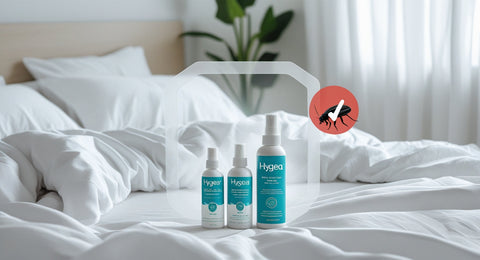Bed bugs are notorious pests, and combating these tiny invaders has always been a challenge. However, growing concerns among entomologists and pest control experts suggest that a new problem is on the rise – bed bugs are becoming increasingly resistant to traditional treatments.
This resistance complicates efforts to eradicate infestations effectively, leaving homeowners and businesses stuck with costly and persistent issues.
But don't fret! We're breaking down what resistance means, why it matters, and most importantly, what you can do to protect yourself and your space.
What are Bed Bugs?
Bed bugs are small, oval-shaped insects that feed on the blood of humans and animals. Measuring about 4–5 millimeters in length, they are reddish-brown and are most active at night.
These pests are commonly found in mattresses, furniture, and crevices, and they often venture out to feed while you’re asleep.
Here’s why they’re a nuisance:
-
Persistent Infestations – Bed bugs reproduce rapidly, so leaving even a few of them unchecked can lead to a full-blown infestation.
-
Irritating Bites – Their bites can cause redness, itchiness, and even allergic reactions in some individuals.
-
Ease of Spread – Bed bugs are excellent hitchhikers. They can travel in luggage, clothing, or furniture, making them difficult to contain.
The Rise of Resistance
Over the past few decades, bed bugs have developed resistance to many traditional insecticides, such as pyrethroids, which were once considered highly effective.
Here's how this resistance has evolved:
-
Natural Selection: Exposure to insecticides kills weaker bed bugs while the stronger, more resistant individuals survive and reproduce.
-
Frequent Chemical Application: Overusing or misusing chemical treatments can accelerate resistance by repeatedly exposing bed bugs to the same formulas.
-
Decreased Efficacy of Products: Many insecticides can no longer penetrate the tough exoskeletons of these pests, reducing their effectiveness drastically.
Recent studies even reveal some populations of bed bugs carrying genetic mutations that make them immune to certain treatments. This phenomenon is leaving frustrated homeowners wondering if there’s a solution to their never-ending battle.
Why Resistance Matters
Understanding why resistance is a growing concern helps highlight the urgency for alternative approaches. Here’s why it matters:
-
Longer Infestations: Resistant bed bugs are harder to eliminate with conventional methods, leading to prolonged infestations.
-
Higher Costs: Repeated pest control measures and ineffective treatments often translate to higher expenses for homeowners and businesses.
-
Health Risks: Ongoing infestations mean prolonged exposure to bites, potential allergic reactions, and even mental health challenges, as the stress of dealing with bed bugs can take a toll.
-
Economic Implications for Businesses: Hotels, hostels, and Airbnbs risk losing customers, developing a damaged reputation, and facing legal liabilities due to inadequate pest control solutions.
Addressing bed bug resistance requires innovative strategies and a shift toward sustainable, effective solutions.
Alternative Solutions
When traditional methods fail, looking to alternative pest control solutions becomes essential. Fortunately, Hygea Natural offers safe and efficient ways to target resistant bed bugs without relying on harsh chemicals.
Our products do more than just repel; they effectively combat bed bugs while being suitable for various household settings.
Some standout solutions include:
-
Bed Bug Sprays: Designed to target bed bugs upon contact, Hygea Natural's sprays penetrate hiding spots like mattress seams and cracks where bed bugs are known to thrive.
-
Laundry Additives: Adding these treatments during your wash cycle helps eliminate bed bugs from clothing, bedding, and towels.
-
Travel Sprays: Perfect for frequent travelers, these compact sprays prevent bed bugs from hitchhiking into your home.
Benefits of Non-Toxic Treatments
Unlike conventional insecticides, non-toxic solutions provide homeowners and businesses with peace of mind. Here’s why:
-
Safe for Families and Pets: Many products are safe for use in homes without compromising the health of residents or their furry friends.
-
Eco-Friendly: Sustainable treatments avoid contributing to environmental pollution, ensuring a safer planet for future generations.
-
No Harsh Chemicals: Non-toxic options prioritize efficacy without relying on harsh or harmful chemical compounds.
By opting for proven non-toxic solutions like Hygea Natural, you can address infestations while keeping your loved ones safe and your indoor environment clean.
How to Use Hygea Natural Products for Bed Bug Control
Here’s a straightforward guide to using Hygea Natural products effectively:
1. Identify the Problem Areas: Begin by thoroughly inspecting your home for signs of infestation, including live bugs, shed skins, and bloodstains in sleeping areas.
2. Apply Bed Bug Spray: Use Hygea Natural’s Extra Strength Bed Bug Spray to treat affected surfaces, like bed frames, box springs, and upholstery. Be sure to focus on the crevices where bed bugs often hide.
3. Use Laundry Additives: Wash all bedding, curtains, and clothing with Hygea Natural’s Bed Bug & Lice Laundry Additive. This will eliminate any bugs or eggs clinging to fabrics.
4. Repeat as Needed: While a single application may address minor infestations, heavily infested homes may require repeat treatments to ensure all bed bugs and their eggs are fully eliminated.
5. Prevent Recurrences: Pair these steps with prevention tips (outlined below) to maintain a bed bug-free space long-term.
Prevention Tips to Avoid Infestations
The best solution to a bed bug problem is prevention. Here are practical steps to stop these pests from gaining a foothold in your home:
-
Inspect Second-Hand Furniture: Always check used furniture for bed bugs or eggs before bringing it home.
-
Travel Smart: Use bed bug travel sprays on your suitcases and clothing when staying at hotels or public accommodations.
-
Declutter Your Space: Reducing clutter minimizes hiding spots for bed bugs, making your home less attractive to them.
-
Wash Bedding Often: Launder your bedding regularly using hot water and Hygea Natural’s Laundry Additive for added protection.
-
Seal Cracks and Crevices: Fixing cracks in walls or furniture prevents bed bugs from finding places to hide.
By incorporating these simple habits, you can significantly reduce the risk of future infestations.
Tackling Resistance Effectively
Bed bug resistance to traditional treatments is a growing concern, but it doesn’t have to mean surrendering to infestation. Safe and effective solutions like those offered by Hygea Natural can make all the difference.
By choosing products that combine innovation with a commitment to safety, you can protect your home, your business, and your peace of mind.




